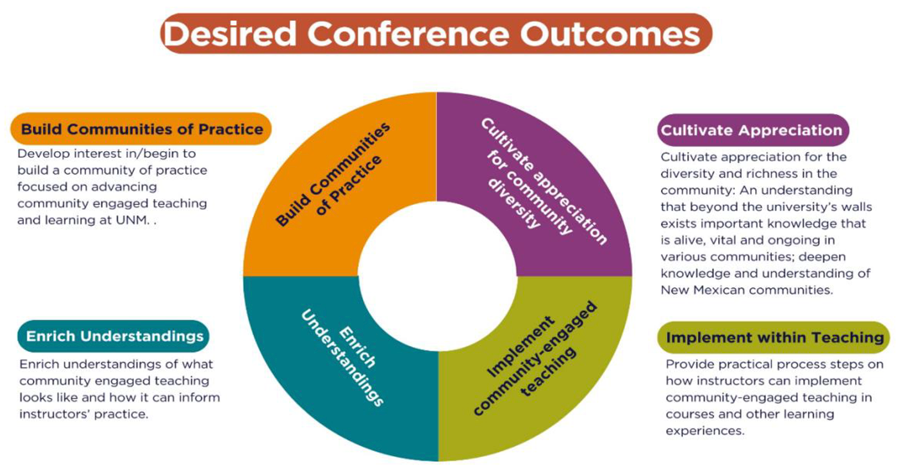Register for Spring Teaching Conference 2024
Call for Proposals
UNM Spring Teaching Conference 2024
April 3 & 4, 2024
Hosted by the Center for Teaching and Learning
Invitation
The Center for Teaching and Learning, in collaboration with the Community Engaged Faculty Advisory Board, the Community Engagement Center, and R. H. Mallory Center for Community Geography invites members of the UNM community and community partners to submit proposals for UNM’s Annual Spring Teaching Conference. This year’s conference is titled Community-Engaged Teaching & Learning. The conference builds on the work of Presidential Teaching Fellow, Dr. Maria Lane (Interim Dean of Graduate Studies and Director, R.H. Center for Community Geography). The keynote address will be delivered by Dr. Nicole Webster, a leader in community-engaged teaching and learning in higher education. Dr. Webster is Associate Dean for Diversity, Equity, and Inclusion, and Faculty Affairs in the College of Health and Human Development at Pennsylvania State University.
This conference aims to create a space where instructors across UNM and community partners can learn from each other and inspire impactful and inclusive community-engaged teaching and learning. In 2020, UNM was honored to be recognized by the Carnegie Foundation as one of only 119 institutions to receive the Carnegie Community Engagement Classification. The Carnegie Foundation describes community engagement as:
the collaboration between institutions of higher education and their larger communities local, regional/state, national, global) for the mutually beneficial creation and exchange of knowledge and resources in a context of partnership and reciprocity. The purpose of community engagement is the partnership (of knowledge and resources) between colleges and universities and the public and private sectors to enrich scholarship, research, and creative activity; enhance curriculum, teaching, and learning; prepare educated, engaged citizens; strengthen democratic values and civic responsibility; address critical societal issues; and contribute to the public good ( UNM Application for the 2020 Carnegie Community Engagement Classification, p. 2)
The conference will include in-person and virtual sessions, depending on the needs and affordances of each session. In-person sessions will take place on April 3 and virtual sessions on April 4.
Please see “Session Types” for more details.
How might I fit in?
All members of the UNM community and broader New Mexican communities are welcome to submit proposals. This includes faculty, staff, students, and community members at all levels of expertise. Members of the UNM community are encouraged to include their community partners as co-presenters/co-facilitators.
Potential Presentation Topic Areas on Community-Engaged Teaching & Learning
Here are some ideas for your presentation. This is not an exhaustive list; we invite other topics that are not included here as well.
- Developing assignments
- Centering the community in courses
- Interdisciplinary courses
- Ethical imperatives in developing courses
- Critical and antiracist practices
- Co-teaching models
- Equity and inclusion
- Developing student leadership
- Teaching and mentoring for implementing community-based research
- Integrating student voice in course design
- Capstone projects, mentoring experiences, and apprenticeships
- Methodologies for crafting equitable partnerships and courses
- Course design, project management, and logistical elements
- Forming and maintaining partnerships
- Student reflections on community-engaged learning
Possible Domains/Project Focus
- Environmental Justice and Sustainability: Community garden projects; local environmental impact assessments; sustainable development initiatives; recycling and waste reduction programs; environmental justice communication and advocacy.
- Cultural and Language Preservation: Heritage preservation projects; oral history documentation; language revitalization/preservation.
- Arts and Creative Expression: Collaborative curations or creative experiences.
- Public Health and Wellness: Community health education and promotion campaigns; collaborative efforts to address public health issues.
- Education and Literacy: Tutoring and mentoring programs for students; adult education initiatives; community education through museums or community centers.
- Social Justice and Equity: Diversity and inclusion workshops; human rights awareness campaigns; public policy and advocacy.
- Community Infrastructure: Renovation or construction projects; community clean-up and beautification; accessible infrastructure initiatives.
- Technology and Innovation: Development of community-centered apps or tools; STEAM projects.
- Food Security: Community-based agriculture projects; food distribution and nutrition programs.
Session Types & Presentation Formats
- Workshops: Sessions in which participants explore approaches, techniques and strategies for implementing community-engaged teaching and learning in their courses, via hands-on activities that lead to the drafting of action plans for implementation. [IN-PERSON]
- Organized panel discussions: These panels are scheduled for 60-minute slots. The panel convener should identify three to four participants to address the proposed topic. [VIRTUAL ON ZOOM]
- Individual presentations: These presentations are 15 minutes long and will be paired with similarly themed presentations. [VIRTUAL ON ZOOM]
- Poster presentations: These presentations are in-person during the April 3rd afternoon session (2 to 4 p.m.). [IN-PERSON]
- Roundtables: Each roundtable will be organized by a theme and facilitated by 2-3 experts [in academic fields]. Each participant will have 10 minutes to share their ongoing community-engaged pedagogical project (e.g., assignment, course). Participants may describe multiple elements of their project (e.g., its conception and anticipated outcomes, pedagogical planning, and implementation of their plans). Each presentation will be followed by a 5-minute feedback session from the experts and other participants at their table. [IN-PERSON]
Session Modalities
In-person sessions will take place on April 3 rd and virtual sessions on April 4 th, 2024.
Proposal Submission
We welcome proposals from UNM's community partners, faculty, staff, graduate and undergraduate students. Please submit your proposal here by February 12 th, 2024. Note: You can use this proposal worksheet [docx] if you’d like to draft your responses before entering them into the form. Among the details we will be requesting are session title, session description, outcomes, session outline, and presenter/panelist names.
Queries and Support
We welcome both seasoned conference contributors and first-timers. Teaching Support and Graduate Support @ the Center for Teaching and Learning are here to offer support, from the pre-submission stage to conference preparation and practice. Prospective participants can reach out via email to Teaching Support and Graduate Support.

